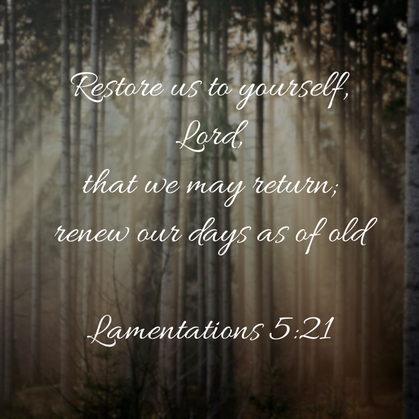|
Good morning!
We're so glad that you're joining us today!
When we met together in person, we shared our joys and concerns together. Take some time to think about both your joys and concerns from the past week. If you have any you would like to share, you can put them in the comments. The prayer below is a prayer of lament, which will lead us into our lesson. Use this to get started, and include thankfulness for your joys as well.
Listening God, with each new day comes fresh news of terror. We lament each new way we find to be inhumane to each other. We lament the numbness many of us feel as we are increasingly desensitized to horror. We sorrow as those harmed by the sin of exclusion and hatred but also as those who are complicit in its execution. We lament the structural sin that can sometimes leave us feeling helpless. But Lord, we aren’t helpless. We tear our clothing; we cry aloud, our tears flow, and our hearts break. Hear the deep pain in our hearts. Help us to hear the deep pain in others. But we will ever trust in you, God, our helper and our defender. We will raise our voices, shout out, and not hold back. You call us to justice. Give us courage to pursue it until the day when all the tears will be wiped from our eyes and we look forward in hope. In the name of the One who has heard our cries and delivers us even from ourselves. Amen.
This week's lesson is on Lamentations 5:1-22.
You do not often hear of sermons on Lamentations. We did have our Lenten devotions on Lament. Most of the time we want to hear about joyful worship. We don’t to dwell on pain Remembering tragedy isn’t the only purpose of Lamentations. The book can teach us much about our relationship with God. The book of Lamentations reflects the period of about 586-538 BC, the period of Babylonian captivity. Remember in our past Sunday School lesson we studied about the prophets warning Judah to turn from sin and turn back to God or suffer God’s judgement. One of those prophets was Jeremiah who is thought to have written Lamentations. As instruments of God’s wrath, the Babylonians destroyed Jerusalem in 586 BC Many who were left alive were carried into exile; the weak and the poor were left behind to contend with foreign settlers. What was once theirs would belong to some one else. They had to pay for food, water and wood. If they didn’t have money they would have to sell themselves to servitude. They would be servants of servants..Women were violated and Princes were hung up by their hands and elders shown no respect. Young men toil at the millstones; boys stagger under loads of wood. Their ancestors sinned and are no more but we bear their punishment. Those who lifted their voices in this lament certainly felt the shockwaves of the sins of previous generations. But throughout those generations, God had promised to relent from punishment when the people repented. The Babylonian exile, shocking in it’s scope, marked the end of God’s patience. The book of Lamentations is witness to how horrifying that judgement was. Joy has gone from their hearts; our dancing has turned to mourning. On verse 16 they take responsibility for their own sins and that God reigns forever. They want God to turn them to him and to renew their days as of old. For them to be transformed by the repentance of the people. They were afraid that God would be so angry with them that he would utterly reject them forever.
Conclusion
In the midst of our suffering, we know that God is still trustworthy and faithful. However, there are times when we do not feel that he is still trustworthy or faithful. We do not know where God is when we confess and repent of our sins but do not experience mercy in the consequences. We find that worship and praise lag behind the mourning and lament. Like those left in a destroyed Jerusalem, all we can see is devastation; the only thing we want is to make sure God sees and knows what we are experiencing. Lamentations help us find language to tell God the very deep, very real pain that we remember or still experience. The book serves as an invitation to take those things to God. As Paul wrote, “Neither death, nor life, neither angels nor demons, neither the present nor the future, nor any powers, neither height or depth, nor anything else in all creation, will be able to separate us from the love of God that is in Christ Jesus our Lord.” Through the inclusion of Lamentations in the Bible may seem odd, it gives evidence of the truth of Paul’s assertion. No siege, no famine, no forced labor, no exile could separate God’s people from his love. God demonstrated this love in Jesus Christ, making a way for all people to turn to the Lord and experience his blessings. Through Jesus’ great suffering, we have been added to those people who will be freed from all suffering. Prayer Father, strengthen us to be willing to turn our hearts to you. Help us to be honest with you as Jeremiah and Jesus were honest in their suffering. In Jesus name we pray. Amen. Thought to Remember Let sorrow draw you closer to God.
Benediction
This week's benediction is from The Message.
Next week's lesson will be on 1 Kings 22:15-23, 26-28.
0 Comments
Leave a Reply. |
AuthorWe are a small, rural Presbyterian church in southwestern Pennsylvania. Archives
July 2024
Categories
All
|



 RSS Feed
RSS Feed